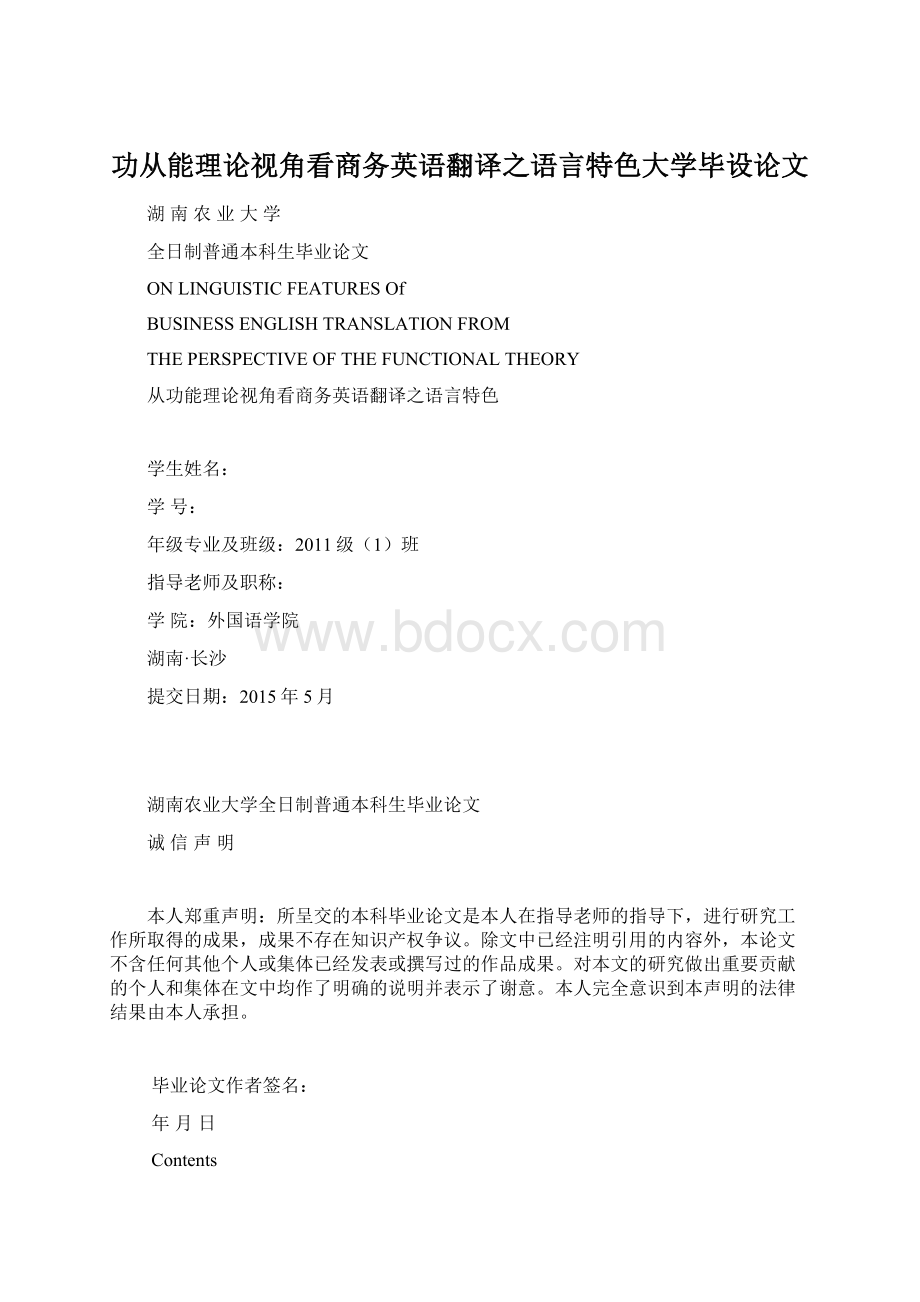功从能理论视角看商务英语翻译之语言特色大学毕设论文文档格式.docx
《功从能理论视角看商务英语翻译之语言特色大学毕设论文文档格式.docx》由会员分享,可在线阅读,更多相关《功从能理论视角看商务英语翻译之语言特色大学毕设论文文档格式.docx(22页珍藏版)》请在冰豆网上搜索。

学院:
外国语学院
湖南·
长沙
提交日期:
2015年5月
湖南农业大学全日制普通本科生毕业论文
诚信声明
本人郑重声明:
所呈交的本科毕业论文是本人在指导老师的指导下,进行研究工作所取得的成果,成果不存在知识产权争议。
除文中已经注明引用的内容外,本论文不含任何其他个人或集体已经发表或撰写过的作品成果。
对本文的研究做出重要贡献的个人和集体在文中均作了明确的说明并表示了谢意。
本人完全意识到本声明的法律结果由本人承担。
毕业论文作者签名:
年月日
Contents
Abstract…………………………………………………………………………………1
Keywords………………………………………………………………………………1
Introduction…………………………………………………………………..........……2
1IntroductionofbusinessEnglish……...……………........................………2
1.1DefinitionofbusinessEnglish………........................................................…………2
1.2ClassificationofbusinessEnglish…….......................................................................3
1.3PreviousstudyonbusinessEnglishtranslation..................................………4
2.Analysisoflinguisticfeaturesfromtheperspectiveoffunctionaltheory...........................4
2.1Functionaltheory...............................…........................................................................5
2.2LinguisticfeaturesofbusinessEnglishtranslation....…......................................6
2.2.1Faithfulness...................…............................................................................................6
2.2.2Exactness...................…...............................................................................................7
2.2.3Consistency...................…............................................................................................8
2.2.4CourtesyandConsideration...................…...................................................................9
3ThelinguisticfeaturesofbusinessEnglish…..............................................................…10
3.1LexicalfeaturesofbusinessEnglish……........................................................……….10
3.1.1Use
of
abbreviations
………………….....................................................................10
3.1.2Use
foreignwords………………………............................................................11
3.1.3Use
archaicwords………………………...............................................................12
3.1.4Use
compounds
……………….............................................................................12
3.1.5Use
formal
words
……….....................................................................................13
3.1.6Use
technique
terms…………………................................................................13
3.1.7Use
shoot
and
simple
verbs………………….....................................................14
3.1.8Use
newvocabulary……………………………………......................................14
3.2Syntactic
features
business
English……………………………………...................14
3.2.1Useoflonganddifficultsentences…………............................................................14
3.2.2Use
programmed
sentence
structure…………………………………...................16
3.2.3Use
strong
opening
sentences………………………………………….................16
3.3DiscoursefeaturesofbusinessEnglish……………………............................................17
3.4ContentcharacterofbusinessEnglish…...................................................................18
3.4.1Objectiveandprescriptive...............................................................................18
3.4.2Aclearpurpose..................................................................................................19
3.4.3Fromsocialaspect.........................................................................................................19
Conclusion…………………………………………………………………………..........…20
Notes………………………………………………………………………………...........…21
Bibliography……...……………………………………………………………………........22
Acknowledgements……………………………………………………………………........23
OnLinguisticFeaturesofBusinessEnglish
TranslationfromthePerspectiveoftheFunctionalTheory
Author:
LiuYi
Tutor:
YiLaibin
(CollegeofForeignLanguages,HunanAgriculturalUniversity,Changsha410128)
Abstract:
Recently,withthedevelopmentofeconomicglobalization,businessEnglishhasbecomemoreandmoresignificant.Differentfromtheliteraryaspectsandotherforms,businessEnglishhasitsownfeatures.ByanalyzingthelinguisticfeaturesofbusinessEnglish,thisthesisputsforwardwithsometranslationprinciplesandstrategies,whichhasinfluencedonsolvingtheproblemsofbusinessEnglish.ThisthesisanalysesthelinguisticfeaturesofbusinessEnglishfromseverallinguisticlevels:
thelexicallevel,thesyntacticlevelandthetextuallevel,whichincludesdiscoursefeaturesandcontentcharacter.Someexamplesareanalyzedandsomecommonmistakesarecorrectedonbasisoftheprinciplesandstrategies.ThethesisaimsatimprovingthequalityofbusinessEnglishandpromotingtheunderstandingandexchangingbetweentwotradingparties.
Keywords:
businessEnglish;
linguisticfeatures
作者:
刘怡
指导老师:
易来宾
(湖南农业大学外国语学院,长沙410128)
摘要:
近来,随着经济全球化的发展,商务英语在国际贸易中的重要性日益突显。
它不同于文学英语等其他形式,具有自身的特点。
通过对商务英语语言特点进行分析,本文提出一些翻译的原则和策略,对解决商务翻译的一些问题有一定的意义。
文章先从几个语言学角度分析商务英语的语言特点:
词汇角度、句法角度、语篇功能角度(包括会话角度和内容角度),其次针对其特点提出几点原则与策略,并在此基础上对大量的商务英语实例进行了分析,对常见错误进行修正。
本文旨在提高商务英语的质量,促进贸易双方的沟通及交流。
关键词:
商务英语,语言特色
Introduction
ScholarsmadetremendouscontributionstobusinessEnglishtranslation.ProfessorJiaWenbopublishedabooknamedPragmaticTranslationwithaFunctionalFewandoneofitschaptersiscontributedtobusinessEnglishtranslation.
However,therearefewbooksthatoffersystematicresearchesandfocusonbusinessEnglishtranslationandfewtheoriesareappliedinbusinessEnglishtranslation.Therefore,whaturgentisthatthesystematicresearchanditssuitabletheoriesonbusinessEnglishtranslationinChina.
Thethesiswillbedividedintofiveparts.PartOneintroducesthetopic.PartTwogoestotheintroductionofbusinessEnglish.PartThreepresentstheanalysisoflinguisticfeaturesfromtheperspectiveoffunctionaltheory.PartFouranalysesthelinguisticfeaturesofbusinessEnglishfromthelexicallevel,thesyntacticlevel,thetextuallevel,includingdiscoursefeaturesandcontentcharacter.Lastpartistheconclusion.So,inthefollowingpartsofthisthesis,theauthorwillgiveanintroductionofbusinessEnglish.
1IntroductionofbusinessEnglish
BusinessEnglishispartofEnglish,butaspecialonewithlinguisticfeatures,thispartwillgiveanintroductionofbothlinguisticfeaturesandbusinessEnglish.
1.1DefinitionofbusinessEnglish
AccordingtoAppliedLinguistics,businessEnglishisoneimportantbranchofESP(EnglishforSpecificPurposes)andisavarietyofEnglishonsocialfunctionbeingusedinspecifiedbusinessenvironment.HutchinsonandWateralsostatedthatbusinessEnglishwasavarietyofESPinthetreeofESP.[1]BusinessEnglishisanorganiccombinationbetweeninternationalbusinessandEnglishlanguage.Itseemsthatwecansaythat“English”isthemedia,and“business”isthecontentinbusinessEnglishcommunication.ThebusinessEnglishspecialistNickBriegerputforwardhistheoryof“thecategoryofbusinessEnglish”in1997andthoughtthatbusinessEnglishincludes:
languageknowledge,communicationskills,professionalcontent,managementskillsandculturalawarenessetc..[2]
“Itisamediatinglanguagebetweenthetechnicalitiesofparticularbusinessandthelanguage,ofthegeneralpublic.Itisnotpurelyforintra-groupcommunication.Thisisnotsurprisingsincebusinessandcommerceisbydefinitionaninterfacebetweengeneralpublicandthespecialproducer.”[3]
WecanfindthatthereisacloserelationshipbetweenbusinessEnglishandbusinessitself.Hereweshouldstressthat“business”isadynamicconcept,thecontentofwhichhasbeenincreasinglyenlarged.Beforetheninetiesofthe20thcentury,itwasbasedonthedefinitiononthenegotiationofUruguayRoundinGATT(GeneralAgreementonTariffsandTrade),whichwasmainlyreferredtointernationalcargotrade.Alongwiththeintegrationofworld’seconomy,theusageofinternetmultimediatechnology,thescopeofbusinesshasbeencontinuouslyenlargedandaccordingly,theconceptofbusinessEnglishhasalsobeenenlarged.Theconceptofmodern“business”includessuchseriesofnegotiationasenquiriesandoffer,counteroffer,bidandcounter-counteroffer,acceptanceandorderetc.;
suchseriesofimportandexportbusinessasissuingL/C,packingandshipment,paymentanddelivery,insurance,inspection,andarbitrationetc.;
anditisevenrelatedtointernationalfinance,foreigninsurance,internationaltourism,internationaltransport,overseasinvestment,internationalcooperationetc..
1.2ClassificationofbusinessEnglish
Sinceinternationalbusinessinvolvesvariousindustriesasmentionedabove,businessEnglishisfocusesonspecificcommunicationrequirementsforbusinessaffairsdealtwithincompanies,factoriesandsuchotherrelatedindustriesasbanking,insurance,financelogistics,transportationetc..SobusinessEnglishcoversawiderangeofrelevantspecificEnglish,suchasfinancialEnglish,advertisingEnglish,foreigntradeEnglishandsoon.
MarkEllisandChristineJohnsonalsostatedthat“businessEnglishdiffersfromothervarietiesofESPinthatitisoftenamixofspecificcontent(relatingtoaparticularjobareaorindustry),andgeneralcontent(relatingtogeneralabilitytocommunicationmoreeffectively)”.[4]
Fromthepracticalperspectives,businessEnglishdiscoursescanbeclassifiedintofollowingseveraltypes:
1)BusinessCorrespondence,2)Memorandum,3)Syn